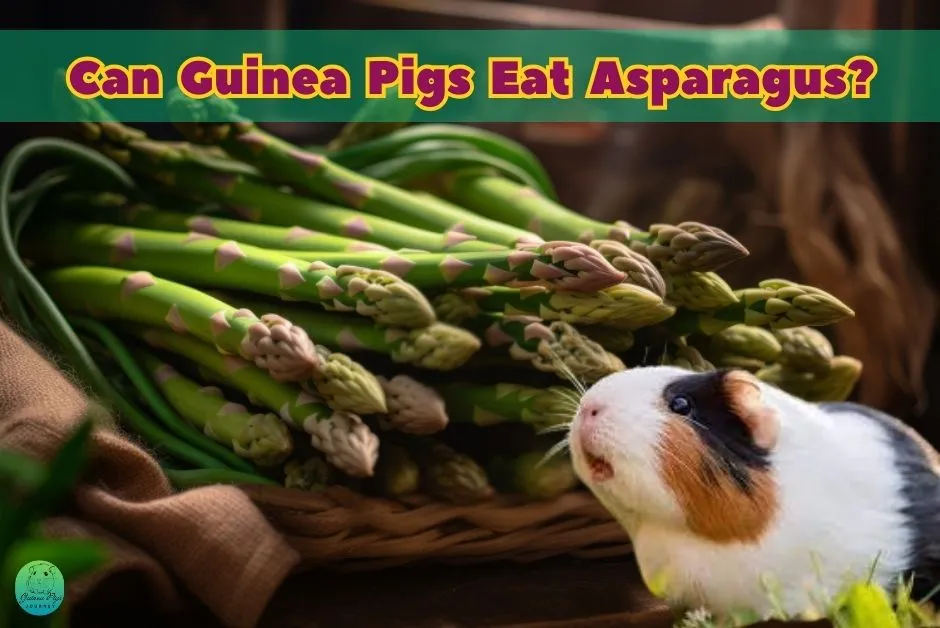Guinea pigs being herbivores creatures love to eat green vegetables like arugula, mustard greens, cilantro, zucchini, snap peas, or wheatgrass. When you think of asparagus, a common query comes to your mind; Can guinea pigs eat asparagus?
Definitely! Yes, Guinea pigs can eat asparagus occasionally but moderation and gradual introduction is the key! As far as other varieties and nutritional benefits and risk factors are concerned it is very important to know these factors before deciding to introduce asparagus in your Guinea pigs diet plan to ensure the safety and overall well-being of your furry friends.
Fun Facts: Asparagus (For Guinea Pigs Owners)
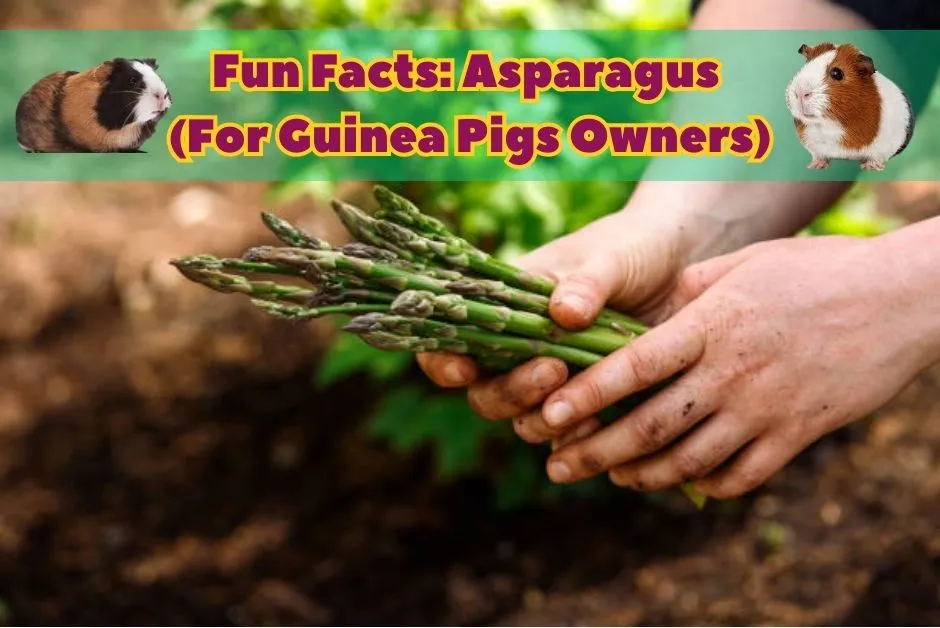
- Asparagus belongs to the family of Asparagaceae plant family and there are almost 300 asparagus species grown in the world It would be very concerning to know the species before feeding to guinea pigs.
- Asparagus once was also classified in the Liliiaceae family including onions, leeks, and garlic but has changed its classification according to a source, which makes it edible food for guinea pigs because guinea pigs should not be fed the onion family plants.
- It was first cultivated about 2500 years ago in Greece, and asparagus is a Greek word that means stalk or shoot.
- There are three main varieties of asparagus: American/British, which is green; purple French; and Spanish/Dutch, which is white. The most common type of asparagus is green; the white asparagus is more delicate and difficult to harvest; the purple asparagus is smaller and fruitier in flavor, which makes an equally important query to know before offering to guinea pigs.
- Asparagus for guinea pigs is a nutritious and tasty addition to any diet. It is low in calories and a great source of nutrients, including fiber, folate, and vitamins A, C, and K.
- Additionally, feeding asparagus to guinea pigs has several potential health benefits, including weight loss, improved digestion, healthy pregnancy outcomes, and lower blood pressure.
Guinea Pigs Diet Considerations:
Guinea pigs being herbivores creatures love to eat plant-based food but ensuring their balanced diet with proper care for their overall health is equally important. For this reason, always introduce new food in moderation and gradual introduction into their diet.
Almost 80% of their diet is primarily based on high-quality fresh hay as a main staple. Whereas, up to 10% of their diet is a variety of fresh vegetables and fruits with the daily or weekly diet plan. Guinea pigs also require almost 30-50 mg of Vitamin C daily to keep them healthy and active. A low in fats and sugar diet must be the priority when choosing any new food to offer these lovely pets. Always ensure to provide them with fresh, clean, chlorine-free, drinking water that must be changed daily to maintain a healthy lifestyle. You may also provide them with a good quality of guinea palleted food but as a treat.
Asparagus for guinea pigs can be a healthy and tasty treat and may also be one of the new additions for guinea pigs in moderation. Asparagus for guinea pigs contains some essential nutrients, Vitamins, minerals, and fiber that can benefit guinea pigs. Asparagus also contains oxalic acid causing bladder stones and calcium causing urinary tract issues if fed excessively to guinea pigs. So, extra care and understanding of the nutritional analysis of asparagus for guinea pigs is very important to maintain a suitable, balanced, and healthy diet plan for guinea pigs.
Nutritional Analysis of Asparagus for Guinea Pigs:
According to the USDA Nutrient Database, Like other green vegetables, asparagus is also a good source of essential nutrients like Vitamin C, A, and K Iron, Magnesium, Potassium, etc. So, it is very crucial to maintain a balanced diet plan for guinea pigs by understanding the nutritional values and percentage before adding asparagus into the guinea pig’s diet plan and implementing the moderation process. Listed below are the nutritional value and percentage per 100 grams of raw asparagus for guinea pigs.
| Nutrients | Value per 100 grams | DV % |
| Energy | 20 kcal | |
| Carbohydrates | 3.88 grams | 1 % |
| Water | 93.2 grams | |
| Fat | 0.12 gram | 0 % |
| Protein | 2.2 grams | 4 % |
| Dietary Fiber | 2.1 grams | 8 % |
| Vitamin C, total ascorbic acid | 5.6 mg | 6 % |
| Vitamin K | 41.6 µg | 35 % |
| Vitamin E | 1.13 mg | 8 % |
| Vitamin A, RAE | 38 µg | 4 % |
| Calories | 20 kcal | |
| Cholesterol | 0.00 mg | 0 % |
| Calcium, Ca | 24 mg | 2 % |
| Phosphorus, P | 52 mg | 4 % |
| Sugar | 1.88 grams | |
| Potassium, K | 202 mg | 4 % |
| Iron, Fe | 2.14 mg | 12 % |
| Magnesium, Mg | 14 mg | 3 % |
| Zinc, Zn | 0.54 mg | 5 % |
| Sodium, Na | 2 mg | 0 % |
| Ash | 0.58 grams | |
| Copper, Cu | 0.189 mg | 21 % |
| Folate | 52 µg | 13 % |
Note: * The % Daily Value (DV) indicates how much a nutrient in a serving of food subsidizes a daily diet.
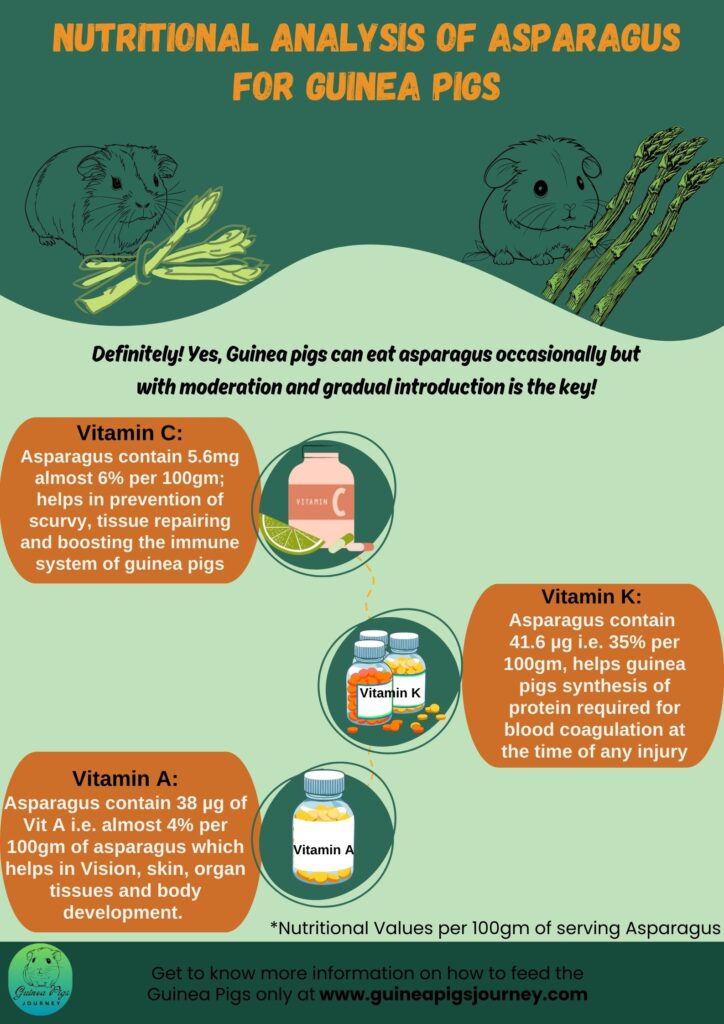
What Are The Nutritional Benefits Of Asparagus For Guinea Pigs?
Asparagus is a powerhouse of some essential nutrients necessary for the overall health of guinea pigs if fed in moderation. Here are some of the benefits for guinea parents to understand the dietary needs of guinea pigs.
Vitamin C: Asparagus contains 5.6mg of vitamin C almost 6% per 100 grams of asparagus very needful element for guinea pigs to prevent scurvy which is very dangerous, painful, and common in guinea pigs affecting overall health and leading to malnutrition. Due to this condition, if guinea pigs get any skin injury they can bleed more than what is normal, and takes longer time for these injuries to heal. Vitamin C also plays a key role in tissue repairing and boosting the immune system of guinea pigs which is very important to make them healthy and active.
However, this amount of almost 6% is not a great source for Guinea pigs as they require almost 30-50mg of vitamin C from their diet. So, it is recommended that some other nutritious vegetables along with asparagus for guinea pigs diet must be considered.
Vitamin K: Asparagus contains a good amount of 41.6 µg i.e. 35% per 100gm of asparagus helps in the synthesis of protein required for blood coagulation at the time of any injury that might occur during hiding in spots in the cage or while jumping in guinea pigs. Consuming vitamin K will help guinea pigs to heal as early as possible. Some studies have also found Vitamin K works along with Vitamin D to improve bone health facilitating bone mineralization, cell growth, and tissue renewal. Vitamin K also supports heart health by preventing the hardening of arteries including calcium out of the artery linings.
Fiber: Asparagus contains 2.1gm fiber i.e. 8% per 100gm of asparagus helping guinea pigs in digestion by containing prebiotic compounds. Guinea pigs have sensitive digestive systems, and due to this reason, it is very important to make them comfortable by moderating and balancing their diet. One serving of asparagus contains more than a gram of soluble fiber, which has been shown to lower our risk of heart disease.
Vitamin A: Asparagus contains 38 µg of Vit A i.e. almost 4% per 100gm of asparagus which helps in Vision, skin, organ tissues, and body development. The development of skin tissues is very crucial for guinea pigs to maintain their overall health and secure them from any kind of fungal infection once injured. Guinea pigs’ bodies restore their skin health and regenerate skin cells with the help of vitamin A and most importantly help fight any type of infection including fungal infections which is a common cause in guinea pigs. Vitamin A is also required for the proper functioning of the heart, liver, and lungs.
Folate: Asparagus contains 52 µg folate i.e. 13% per 100gm of asparagus which is a B-Vitamin required for various functions of the body in guinea pigs. Folate helps in the formation of RBCs (Red blood cells), produces DNA the building block of a body, and the conversion of carbohydrates into energy for guinea pigs’ bodies. Folate also helps pregnant guinea pigs for a healthy pregnancy. Folate also works with vitamins C and B12 to help the guinea pig’s bodies break down, use, and create new proteins.
Glutathione: Asparagus contains a detoxifying compound known as glutathione which plays a crucial role in immune function. This means that asparagus may help guinea pigs fight or protect against certain cancers, including bone, breast, lung, and colon cancers. It is also thought to slow the aging process and break down free radicals; it can also help to protect your skin from sun damage and pollution. Glutathione is considered to be the “master antioxidant” and the most important regulator that controls inflammatory processes.
Risks of Excessive Feeding of Asparagus For Guinea Pigs:
Unfortunately, asparagus for guinea pigs in excess can be harmful. It is very crucial to be a responsible pet owner who always feeds the food in moderation to avoid any kind of hazardous situation and consult a veterinarian for any guidance.
Digestive Upset: Guinea pigs have a sensitive digestive system as explained earlier, excessive consumption of asparagus by guinea pigs may lead to some serious digestive issues like bloating, diarrhea, gas, or stomach issues. It is well recommended that introduce any new diet including asparagus for guinea pigs gradually and monitor your guinea pigs for any sign of discomfort or allergy.
Allergic Reactions: Asparagus for guinea pigs may also cause allergic reactions like skin irritation or respiratory issues when fed excessively.
Urinary issues: Asparagus also contains oxalates, if fed excessively can lead to the formation of urinary stones in guinea pigs. Ensure a well-balanced diet, including other vegetables and sufficient water intake to reduce the risk of urinary issues.
Bladder Stone formation: Asparagus contains calcium, which in excess amount if ingested by guinea pigs can lead to the formation of bladder stones which is also a common problem in guinea pigs. So, always ensure the proper diet plan contains low-calcium veggies and fruits for guinea pigs.
Pesticide Residues: Ensure to buy organic asparagus for guinea pigs and thoroughly wash it to remove any pesticide, or toxic chemical deposits that may harm your guinea pig’s digestive system also, and lead to diarrhea. Remember, always monitor your pets for any adverse reactions.
How to Prepare Asparagus for Guinea Pigs?
To make a special treat for guinea pigs, sometimes it must be confusing for us to prepare a treat for our furry friends. So, let’s know some key steps to consider while preparing asparagus for guinea pigs as a treat:

Step-1: Purchase / Choose good quality: Always buy some fresh, green, and healthy pieces of asparagus for guinea pigs from a verified store or verified dealer, ensure that asparagus is not spoiled, rotting, or overly wilted so that you can have some good quality and fresh asparagus for guinea pigs.
Step-2: Wash and dry the Asparagus for guinea pigs: Thoroughly wash and clean the asparagus in running water to remove the chemicals, pesticides, or traces of germs. After washing let them dry properly before offering.
Step-3: Tips and Stalk Removal (Optional): You may also remove or cut the stalks and tips of asparagus, but it is optional. Although guinea pigs can eat these parts very easily and enjoy it.
Step-4: Slice Asparagus into small pieces: As a treat, asparagus after washing properly, you may slice it into small chewable size pieces to avoid choking issues.
Step-5: Introduce in appropriate quantity: You must feed the recommended size asparagus to your guinea pigs gradually and in small pieces by mixing it with other veggies as a varied food and observe any reaction or sign before serving more or frequency of feeding. So that any kind of reaction may be avoided.
Step-5: Treat / Serve Asparagus: You may also give asparagus salad by mixing it with other veggies to your guinea pigs as a treat like feeding it with your hands or holding the guinea pig on your lap. You can also serve them like ½ amount in the morning and the other half in the evening to ensure the moderation and gradual introduction.
Step-6: Remove Uneaten Asparagus: In the last when your guinea pigs are done with eating asparagus, remove the uneaten asparagus from the cage or their surroundings to avoid the multiplication of bacteria and inviting flies that can be harmful to guinea pigs.
It is recommended, that use the asparagus within 3 days to keep the fresh for guinea pigs. Only wash the asparagus before feeding it to guinea pigs to keep them tasty and avoid the wilt factor.
Frequency and Portion of Serving Asparagus For Guinea Pigs:
Guinea pigs require extra care once introducing any new food including asparagus to ensure a balanced and varied diet. Always remember, that moderation and gradual introduction are the keys to serving any food. When it comes to serving asparagus for guinea pigs, it’s important to pay attention to both frequency and portion sizes to maintain a healthy nutritional balance.
The portion of Serving Asparagus For Guinea Pigs: Start with a small portion per serving to ensure moderation. A few small slices around half an inch thick may be enough for each guinea pig.
Frequency of Serving Asparagus For Guinea Pigs: Optimal frequency i.e. once or twice a week mixed with other beneficial veggies may be enough per serving. While asparagus can be a nutritious addition to your guinea pig’s diet, moderation is key. Limiting the frequency ensures they receive a diverse range of nutrients from other vegetables and sources.
Can Guinea Pigs Eat Asparagus All Parts?
Although guinea pigs love to enjoy asparagus in their diet, it is equally crucial to know which parts are safe for guinea pigs to feed.
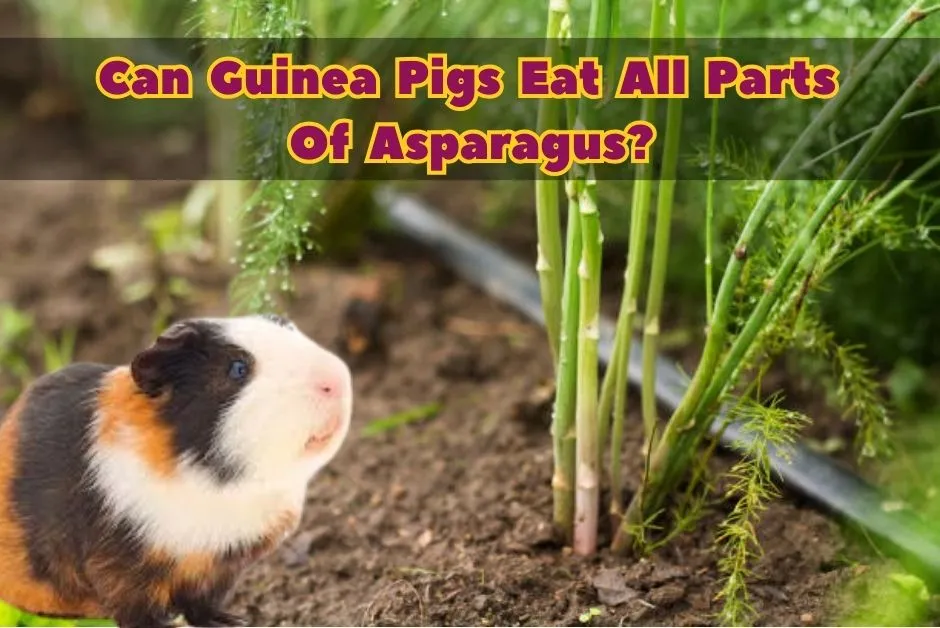
Can Guinea Pigs Eat Asparagus Tips / Ends (Spears): Yes, the tender Asparagus tips or ends are safe to feed to guinea pigs but with moderation. Make sure that tips are properly washed before offering. Guinea pigs will bite on the soft and succulent tips of asparagus, which are rich in essential nutrients without being too fibrous.
Can Guinea Pigs Eat Asparagus Stalks (Midsection): Yes, Guinea pigs can eat the midsection stalks of asparagus. Whereas, the lower portion of asparagus stalks is a bit harder and less appealing for guinea pigs. So, you can provide them with a midsection of asparagus stalks in moderation to make them enjoy eating.
Can Guinea Pigs Eat Asparagus Leaves: Yes, Guinea pigs can enjoy asparagus leaves in moderation but it would be essential to balance their diet with other leafy green vegetables.
Can Guinea Pigs Eat Asparagus All Types?
It is recommended to always serve raw asparagus only to guinea pigs as it contains many nutrients that may otherwise get lost during cooking. Let’s know what other types of asparagus are to be fed or avoided by guinea pigs.
Cooked or Processed Asparagus for Guinea Pigs: No, avoid feeding cooked or processed asparagus that contains salts, flavor, spices, or other ingredients to your guinea pigs as they have sensitive digestive systems that can lead to diarrhea, and stomach upset if fed with cooked or processed asparagus. Thus, make sure to feed only fresh and raw asparagus to your furry friends.
Canned Asparagus for Guinea Pigs: No, avoid offering canned asparagus to your cavies as it contains flavor, chemicals, additives, or seasoning that can be harmful to your guinea pig’s digestive health. Serve them with raw asparagus to ensure their health.
Dried Asparagus for Guinea Pigs: No, avoid serving dried asparagus to your guinea pigs as it contains excessive sugar content that can contribute to weight gain and subsequently lead to diabetes for your cavies.
Green Asparagus for Guinea Pigs: Yes, guinea pigs can eat Green asparagus also known as American/British asparagus is the most common type and it is safe to feed to guinea pigs providing a good balance of nutrients if fed in moderation.
White Asparagus for Guinea Pigs: Yes, guinea pigs can eat white asparagus also known as Spanish/Dutch asparagus but limited consumption is generally safe for guinea pigs with moderation. White asparagus is more delicate and is difficult to harvest. White asparagus is grown in the absence of sunlight to prevent chlorophyll from developing. Some studies have found the highest antioxidant activity to be in green asparagus and the lowest in white. White asparagus is slightly more fibrous than the green variety. Offer it in moderation to prevent digestive issues.
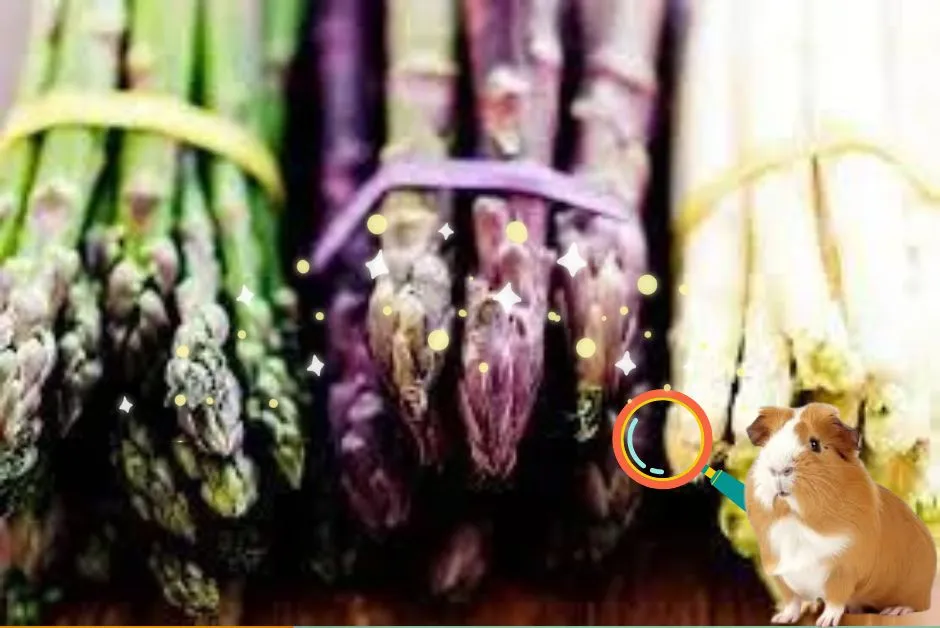
Purple Asparagus for Guinea Pigs: Yes, Guinea pigs can eat Purple asparagus also known as French asparagus in moderation. Purple asparagus is smaller and fruitier in flavor and offers a similar nutritional profile to green asparagus. It adds visual variety to their diet. Purple asparagus in particular is also a great source of anthocyanins, the same beneficial phytochemicals found in berries.
Alternative of Asparagus for Guinea Pigs:

Guinea pigs have individual preferences, some guinea pigs may love asparagus, while others may show less interest. Adjust portions with varied alternatives based on their individual preferences, but always ensure a well-rounded diet with moderation. Listed below are the healthy fruits or veggies that may be mixed with asparagus as a varied diet or an alternative of asparagus for guinea pigs with moderation.
| Mustard greens | Kale, raw | Arugula | Snap Peas |
| Pumpkin, raw | Kohlrabi, raw | Arrowroot, raw | Tomatillos, raw |
| Rutabagas, raw | Cilantro | Butternut Squash | Spinach, raw |
| Mushrooms, Raw | Pumpkin seeds | Blackberries | Grapefruit |
| Nectarines | Cantaloupe | Wheatgrass | Pears |
Frequently Asked Questions (FAQs):
Q:1 Overall, is it ok to feed asparagus to guinea pigs?
Yes, asparagus is safe to feed to your cavies with moderation. Just monitor your guinea pigs while eating asparagus for any kind of behavioral change or allergy. Introduce asparagus gradually in guinea pigs’ diet for potential benefits.
Q:2 Do guinea pigs like Asparagus?
Yes, guinea pigs love to eat asparagus but ensuring the portion and frequency of feeding is guinea parents’ responsibility. Always remember to offer any new food with moderation to cavies.
Q:3 Can baby guinea pigs (pups) eat asparagus?
It is advisable to avoid feeding asparagus to baby guinea pigs that are almost 4-6 weeks of age due to digestive issues. After 4-6 weeks of age baby guinea pigs can eat asparagus but start with a small portion.

